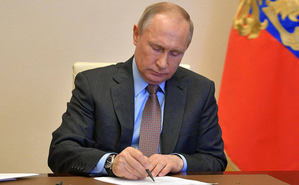America
Putin Cautions US: Cold War-Era Missile Crisis Risks if Missiles Deployed to Germany

July 29, Moscow, Russia :
Russian President Vladimir Putin has cautioned the US against stationing long-range missiles in Germany, stating that Moscow would resume manufacture of intermediate-range nuclear weapons and place similar missiles within striking distance of the West if the US did so . The United States recently announced plans to militarize Germany over the long term, beginning with the deployment of long-range missiles such as the SM-6, Tomahawk cruise missiles, and hypersonic weapons in development. The deployment is expected to begin in 2026. Putin warned that the United States may cause a "Cold War-style missile crisis" in his address to sailors from Russia, China, Algeria, and India in honor of Russian Navy Day in St. Petersburg, the former imperial capital.
"The flight time to targets on our territory of such missiles, which in the future may be equipped with nuclear warheads, will be about 10 minutes," Putin told reporters on Sunday. "We will take mirror measures to deploy, taking into account the actions of the United States, its satellites in Europe and in other regions of the world," the leader of Russia said.
In 1987, the United States and the Soviet Union inked the Intermediate-Range Nuclear Forces (INF) Treaty, which addressed these missiles. Their range is 500 to 5,500 kilometers, or 310 to 3,420 miles. However, according to Al Jazeera, in 2019, both Moscow and Washington withdrew from the arms control deal, claiming that the other had violated the agreement.
Putin, who had already dispatched troops into Ukraine in 2022, frames the conflict as an integral aspect of a 'historic struggle' with the West, which, in his view, shamed Russia following the fall of the Soviet Union in 1991 by expanding its power into what he perceives as Moscow's area of influence. Meanwhile, Western countries and Ukraine accuse Putin of plotting a "imperial-style landgrab." Russia presently controls almost 18% of Ukraine, including Crimea and portions of four provinces in the east, but they have vowed to defeat them. Those regions, which were formerly a part of Russia's empire, will "never be given back," according to Russia's official statements.
According to US and Russian diplomats, relations between the two nations are at an all-time low, rivaling that of the Cuban Missile Crisis of 1962. There have been accusations that both powers are actively working to escalate the situation, despite their calls for de-escalation.
"This situation is reminiscent of the events of the Cold War related to the deployment of American medium-range Pershing missiles in Europe," he added. As the Cold War reached its peak in the 1980s, the United States stationed Pershing ballistic missiles in West Germany. Even after Germany's reunification and far into the 1990s, US missiles remained stationed there. The United States drastically cut the number of missiles stationed in Europe after the Cold War ended because Moscow no longer posed a threat. Midway through July, the Kremlin had already warned that European capitals would become missile targets due to the planned US deployment.
Gradually, we are moving closer to the Cold War. Kremlin spokesman Dmitry Peskov told a state TV reporter that all the characteristics of the Cold War, including direct conflict, are returning.



































